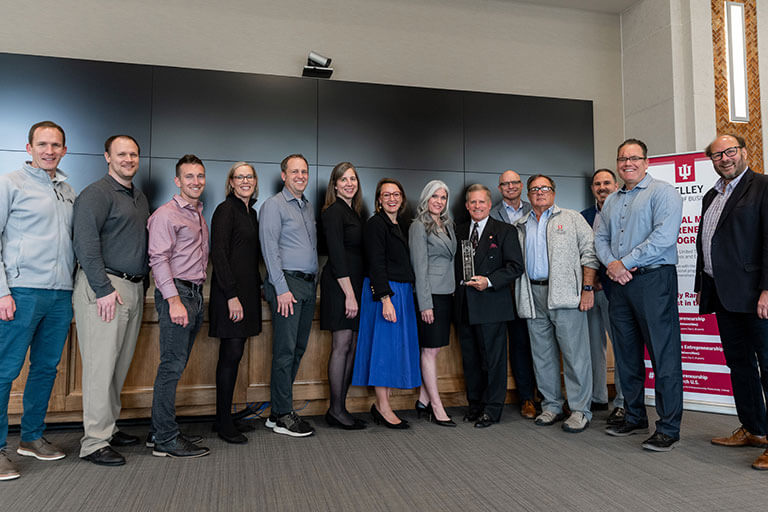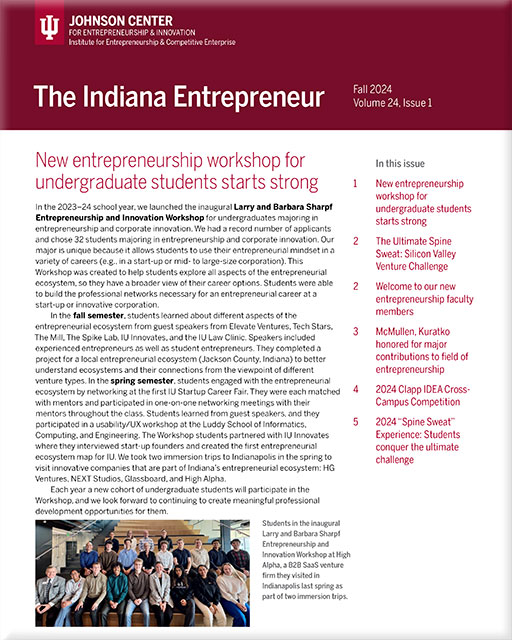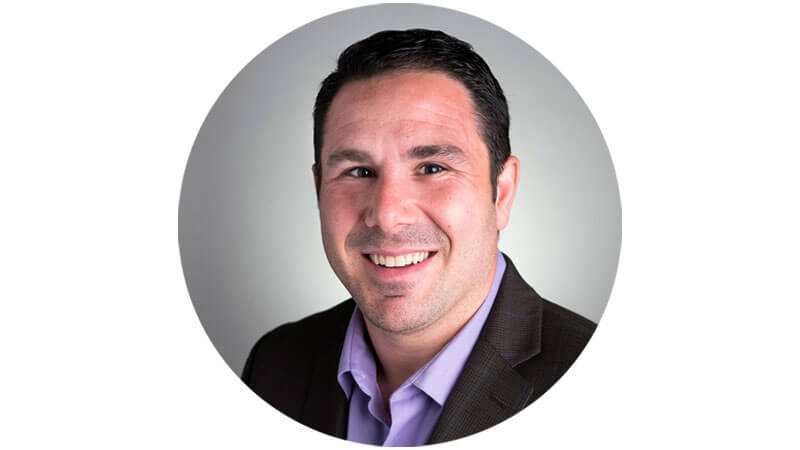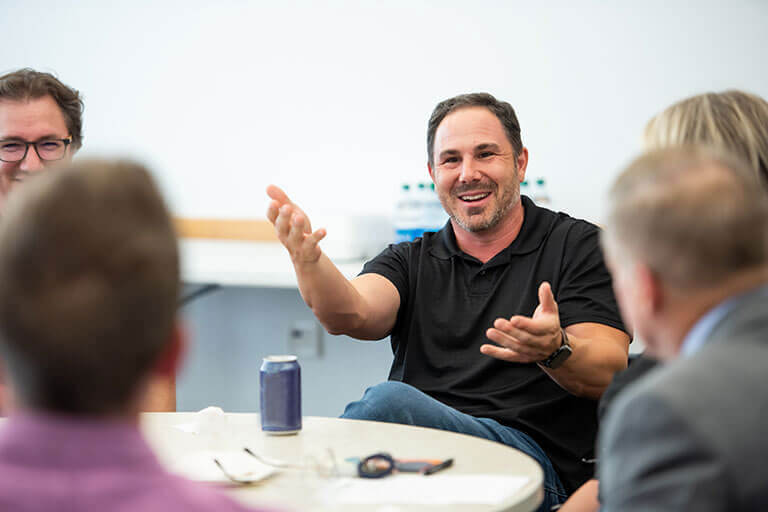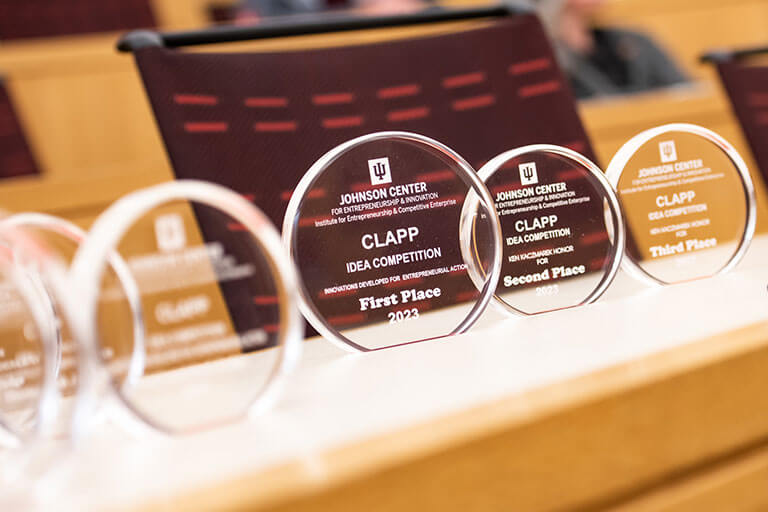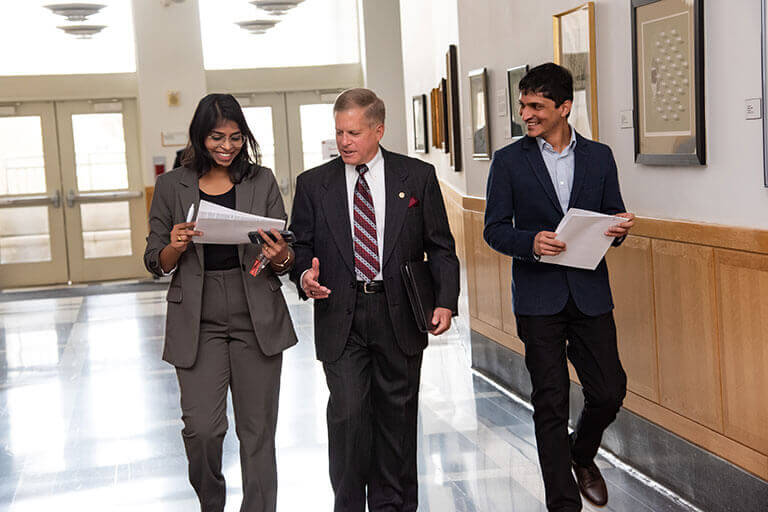Description of the video:
Narrator (Dr. Donald Kuratko):
Innovation; it's a word that conjures up many images: imagination, ingenuity, creativity. A recent article in Wired magazine called it the most overused and yet the most important word in the world today. Yet I believe it's fraught with myths.
There's a lot of things that we believe about innovation that are simply not true. The ability to innovate, for example, people think is a location. In other words, Silicon Valley or Route 6 in Boston, that if they're in that location, that automatically innovation happens.
Or they believe it's the environment, so they get bean bags or food stations and think by sitting in a bag or having certain kind of food, the ideas are just gonna sprout out.
Or worse yet, they think it's only a select few people that really have the ability to innovate.
Well, the fact is we all have the ability to innovate. You see, it resides in all of us in something I call the entrepreneurial mindset.
This mindset is something that we can all tap into, and we can come up with new ideas and solve problems and have creative solutions if we only try.
But yet sometimes we believe these myths, and therefore, we block our ability to do that. It's really pretty sad when you think that one of the greatest assets we possess is our entrepreneurial mindset.
When you look at the world today, you can see that the gap between what can be imagined and what can be accomplished has never been smaller, and so if we are to accomplish some great things, we need to tap into our own entrepreneurial mindset.
So what exactly is this entrepreneurial mindset that I believe everyone possesses? Well, a comprehensive definition states that it's a dynamic process of vision, change, and creation. It requires the application of energy and passion towards the implementation and creation of new ideas and creative solutions.
It also has a sense to recognize opportunity where others see chaos, contradiction, and confusion. Now, that's a long definition, but people say what do I focus on?
I say, maybe the key words of vision, change, creation, energy, and passion, because we all possess that. Everyone has the ability to dream and to vision. Everyone has the adaptability to change. Everyone, I believe, has a desire to create something in their life, and certainly we all have energy and passion that we can put to that.
But as I tell all my students, isn't the one big idea you're looking for, it's an exploration of many ideas so you can pivot off those and learn to maybe find the one that's most passionate and most energetic to you.
Remember, there is no future believing something can't be done. The future's in making something happen. And by tapping into your entrepreneurial mindset, you have that ability to make tomorrow better for you and for all of us.
So now that we know what the entrepreneurial mindset is, why is it so difficult for all of us to actually use it or delve into it?
Well I believe there's two major reasons. One, I think, is what I call the world of paradigms. We all know what paradigms are, right? They are the boundaries, the rules, the perceptions that we live by. There's nothing wrong with paradigms in and of themselves, but when we become so wedded to them that we fail to ask any questions of why they even exist, we then start to get into what I call the terminal disease of certainty, paradigm paralysis. And when that happens, it shuts out all new ideas and all possible innovations, so our mindset just cannot work in that.
A second major reason is something we do to ourselves or others do to us. I call them the idea stoppers.
It's when we suggest something new, and people have an inadvertent answer back. So for example, you suggest something new as an idea, and the answer you get back is are you kidding? Or the answer you get back is we've already tried that years ago. Or even what I call the guilt trip. I don't see anything wrong with the way we're doing it now, do you?
I mean, how do you answer those things? We have to be careful with idea stoppers, so I want you to be able to watch what you say to others and be able to dissect what others say to you. You need to get away from the idea stoppers, break through the paradigms, and follow the new ideas, because that's the way the entrepreneurial mindset works.
Well, now we've had time to ponder the various aspects of the entrepreneurial mindset. We've looked at the importance of it. We've looked at the definition of it. We've even looked at some of the obstacles to actually using it.
So, the question becomes what's the next step? Well, the next step is implementation, and when we look at implementation, it's really up to you.
As I tell all of my students, the decision to act entrepreneurially is and always will remain with you, so it becomes a personal decision. As you ponder that decision, I think about a commercial that was done years ago by Apple computer, where the narrator came on TV and said, "Here's to the crazy ones, to the rebels, to those who think differently. And while some people see those people as crazy, we see genius, because those people who think they can change the world are the ones who usually do."
And the reason I like that commercial is because when you think about it, it exemplifies the courage and belief that you have to have with your new ideas.
Another way to look at it is something that I tell many of my students and corporate clients, and that is if you really wanna tap into the entrepreneurial mindset, you have to expect more than others think is practical, you have to dare more than others think is wise, you have to dream more than others think is possible, and you have to risk more than others think is safe.
And if you tap into those elements, you've tapped into the essence of the entrepreneurial mindset, and by so doing, you will tap into the greatest part of your own true spirit.

